Christmas Gift Ideas for Longevity Enthusiasts
5 low-cost gifts for anyone who wants to live a longer, healthier life
Join the club for FREE to access the whole archive and other member benefits.
I attended the Smart Ageing Summit in Oxford last weekend. I'd promised myself that I would just relax and enjoy it, but I couldn't resist taking a few notes which I thought I'd share.
First impressions were that the organisers, Oxford Longevity Project, had secured another beautiful venue – the Jacqueline du Pré Music Building within the grounds of St Hilda's College, part of Oxford University. And that they practice what the preach – not the usual selection of pastries to welcome the visitors, but plates of fresh fruit. Additionally, the presentations were interspersed with breathing exercises and movement sessions to keep us active and healthy throughout the day.
Leslie Kenny kicked off, sharing the stage with Sunny Singh, to present some interesting results from the Roundglass Foundation’s Global Longevity Survey. Around the world roughly 50% of people now want to live forever – this is a huge jump up on older surveys where it was often below 20% - maybe our message is getting out there! The audience weren’t perhaps as keen, with most expecting to live to 100, they gave a cheer for living to 120 in good health, but only 4 of us put our hands up for wanting to live forever.
Sunny Singh then gave a passionate talk on how healthcare provision needs changing – to a ‘business of care’ not a ‘system of care’.
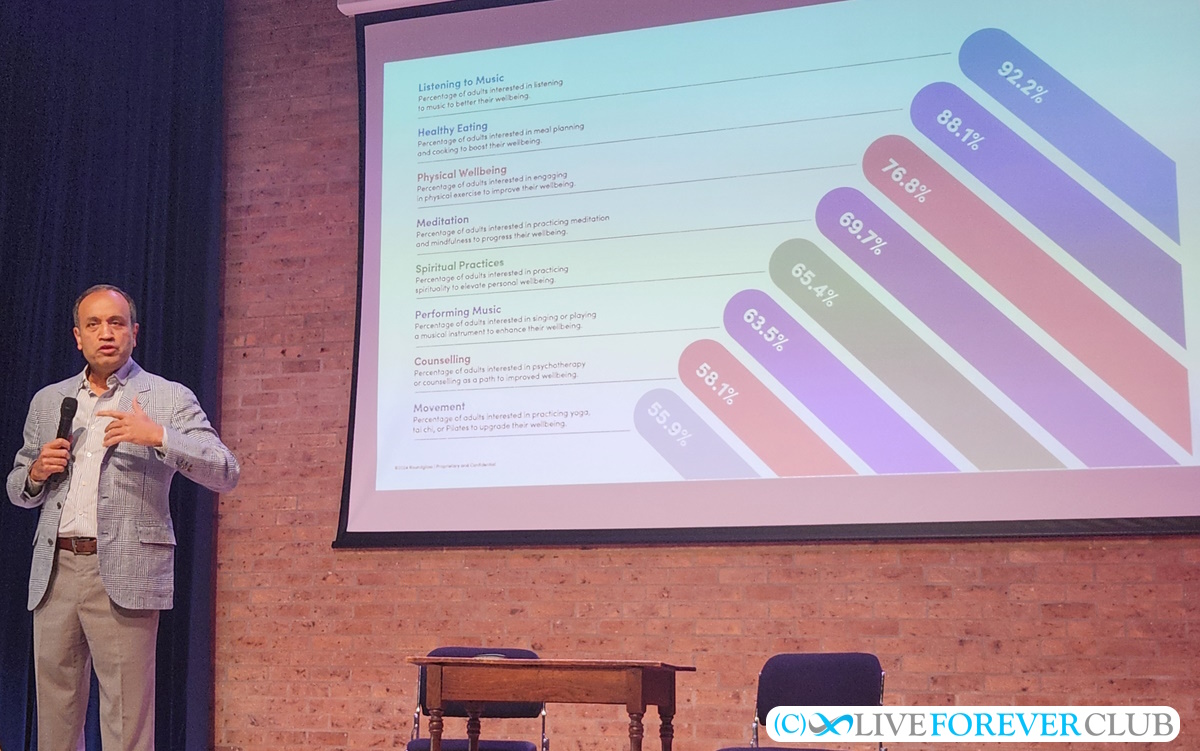
His foundation promotes knowledge sharing and equals access to all – in close alignment with the club’s motto of equality in longevity.
He made a statistically basic point, but one that hadn’t really hit home to me before, that if a condition affects more than 30% of the populate, then that means almost every family has the issue, so the impacts are universal.
A very entertaining presenter, he is campaigning for activity prescriptions – where GPs prescribe physical and social activities from a database of local groups based on your post code. Also, repeat drug prescriptions could have a nudge contained with them to remind people how important activity is. A trial is being launch in Hertfordshire later this year.
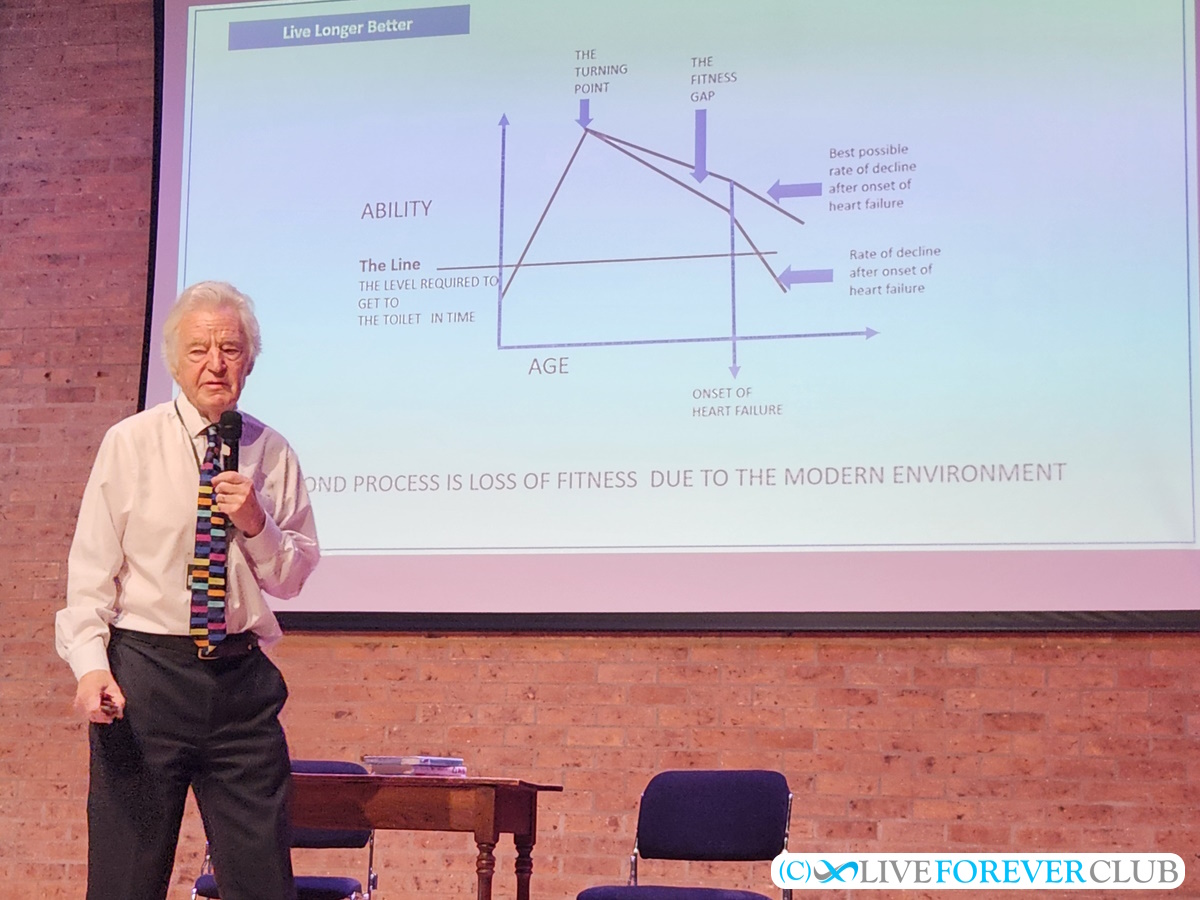
He also recommends five minutes exercise every hour, and would like to see computers switch off automatically to force people to take a time out. Interesting idea – I’m sure someone could deliver an app for that.
His final message: you are responsible for your health care. And to help action it, why not have a look at one of his "sod it" books?!
Head, UK Space Innovation Lab, Oxford University
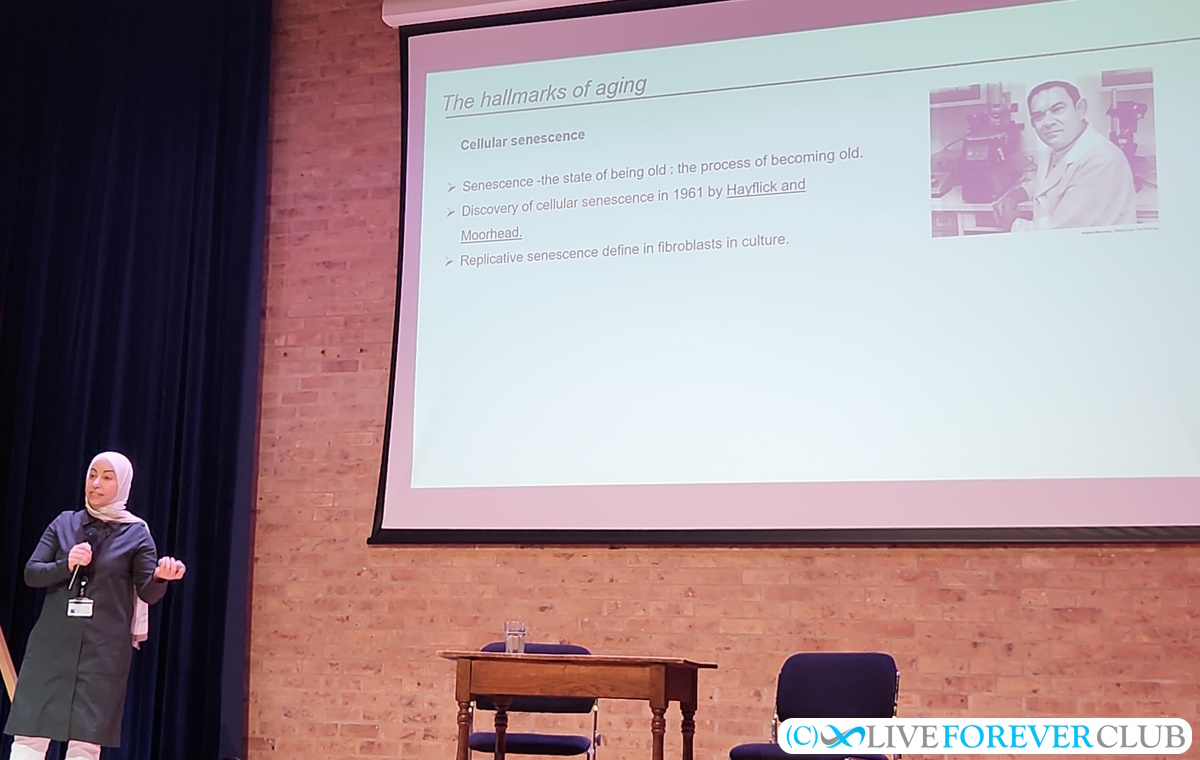
Key points:
This was an intriguing talk, explaining how a tipping point can be reached which means even after stopping an unhealthy behaviour its effects could continue forever. I wonder what other metabolic diseases could have a similar trigger?
They explained that blood glucose is a cause of heart disease, but treating doesn't reduce the risk of it happening. This is because of cellular memory (epigenetics) in bone marrow stem cells. Once they have changed their behaviour (caused by high blood glucose) to be more atherosclerosis inducing, when the blood sugar level was reduced the behaviour continued.
In an experiment, bone marrow was transplanted from diabetic mice to healthy mice – which then had a higher risk of atherosclerosis because the bone marrow had been permanently reprogrammed (Edgar et al - Circulation, 2021).
Worryingly, they explained that it is plausible that the effect could be transmitted to next generation through epigenetics.
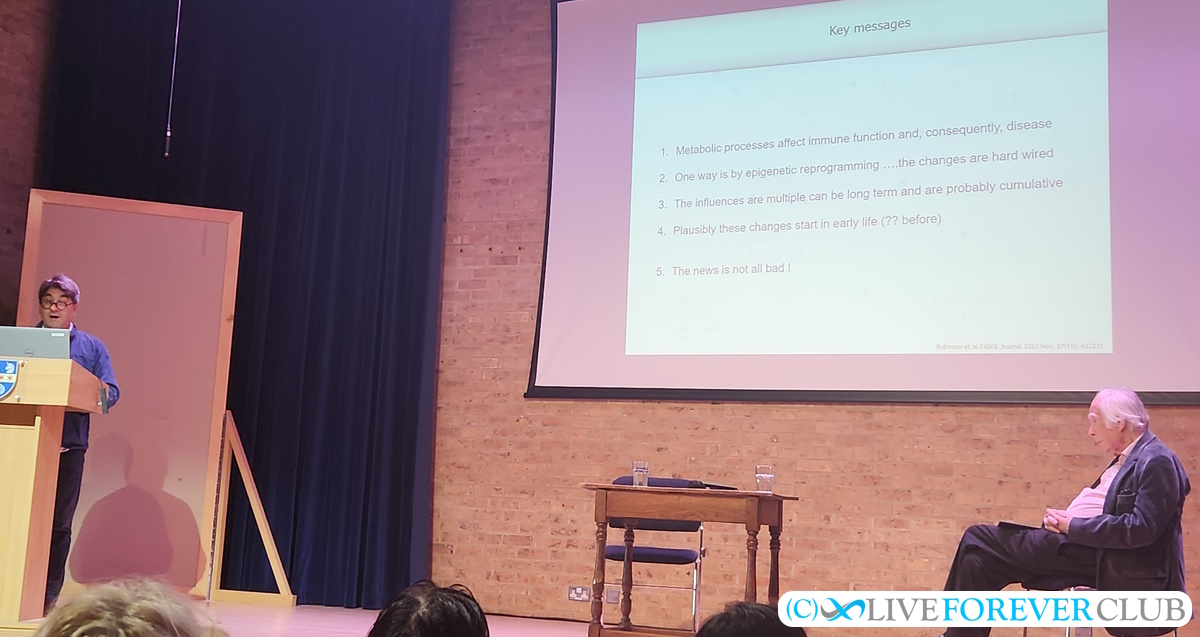
I will say that the photo doesn’t represent how energetic Denis Noble is when he speaks!
I also spoke briefly to Professor Choudhury after his talk to ask about his view on Circularity Therapeutics’ approach to removing oxidised cholesterol from arterial plaques to allow the body to clear them out of the system. Although not familiar with the company’s work, he explained that atherosclerosis regression is a valid approach and even something he’d looked into over 20 years ago. Unfortunately, the molecule tested didn't work as a drug.
Dr Kaufmann (aka Sandy) is the Chief of Pediatric Anesthesia at the Joe DiMaggio Children’s Hospital, but more relevantly here, has a serious interest in the science of anti-aging and has developed a protocol to help curb the effects of time on the human body.
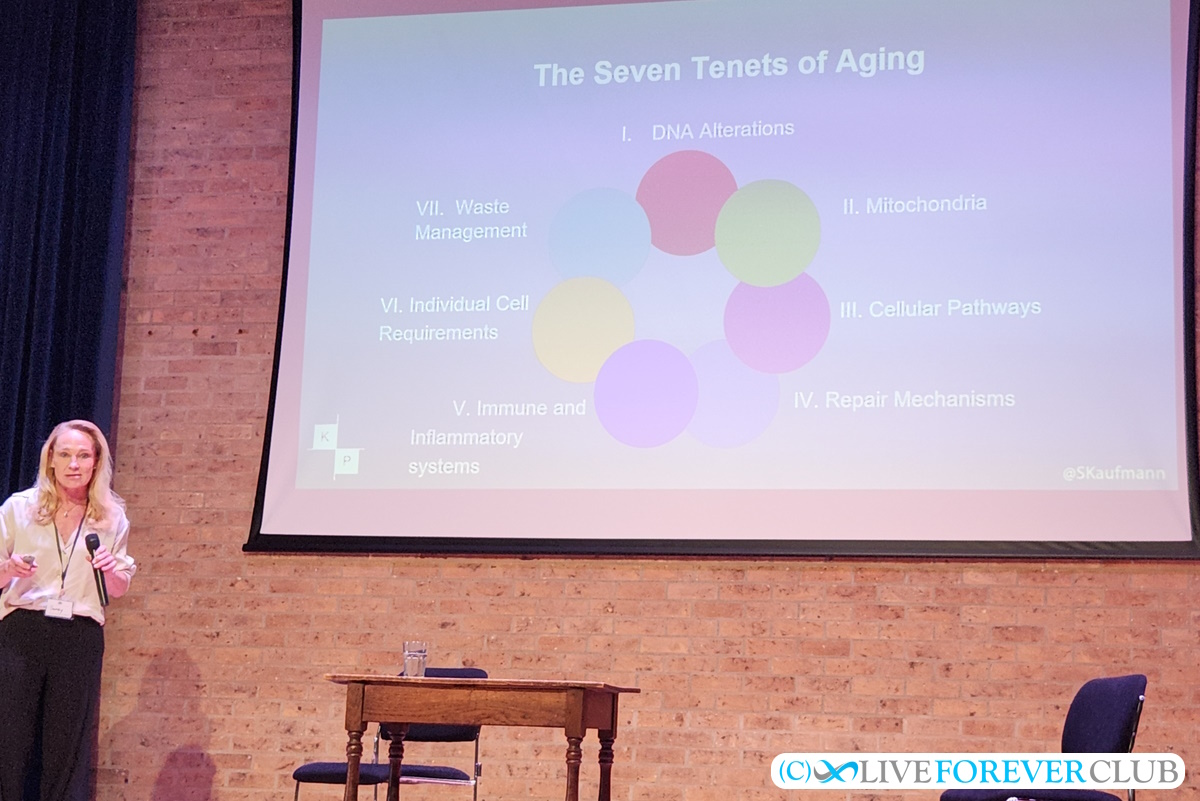
The protocol (and related book) describes seven tenants of ageing (similar to the hallmarks), and the options for tackling each one. A few key points mentioned in her talk are:
Dr Senga gave quite a technical talk, but lightened it up with the question, is someone sneezing on you a 30 second facial?! It results in elasticity and moisture going up, plus inflammation going down, so generally speaking good a reaction… but don’t let it get into your nose!
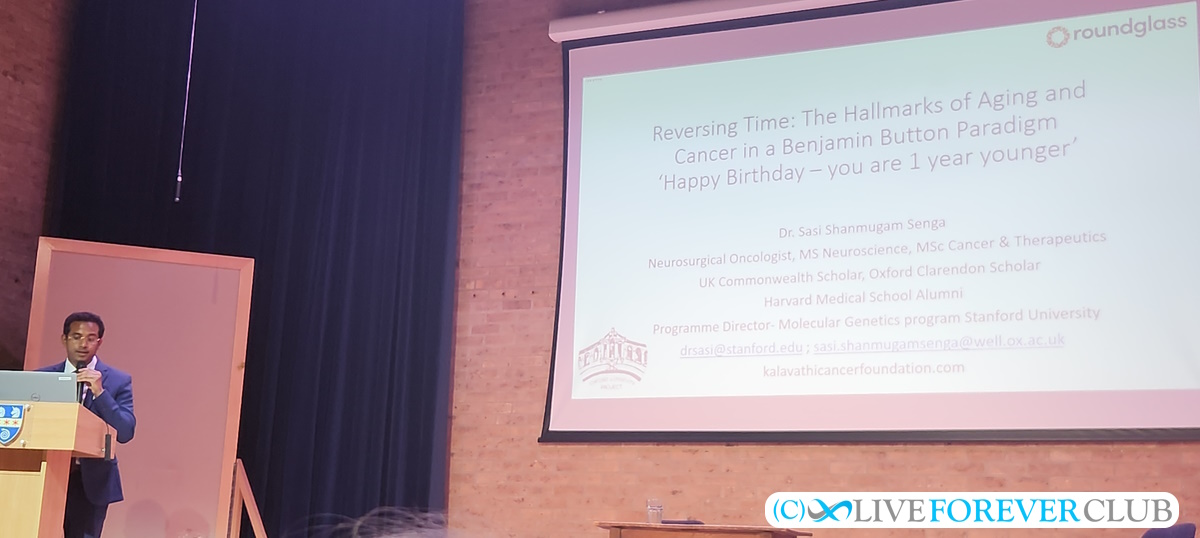
He also highlighted the mental health benefits of hugs that last for six seconds or more.
I wasn't able to stay for the whole day so unfortunately missed the last few interesting speakers which were:
Fortunately I’ve heard most of the speak before, and would recommend taking the opportunity to do so if you can.
It’s always motivating to meet with other like-minded people who are keen on living longer, healthier lives. Even if most aren’t seeking radical life extension, at the moment the first step is the same… a healthy lifestyle to help you live long enough to live forever.
So as well as some fascinating talks, I also had several enjoyable and insightful chats with other attendees. One of which was with a foundation doctor – in itself encouraging to see young doctors thinking beyond the current sickcare model. He explained that antibiotic compliance is better in pets than it is in people (and probably children too) because people look after each other more than they look after themselves.
All in all, a most enjoyable day. Looking forward to Smart Ageing Summit 2025!
Click on resource name for more details.
British biologist and Emeritus Professor of Cardiovascular Physiology at the University of Oxford
Neurosurgical Oncologist, Lecturer in Medicine, Author & Researcher at the University of Oxford
29-Jun-2024
Enhance your health span and longevity with these expert talks organized by Oxford Longevity Project (Oxford, UK)
General Election 2024 Longevity Policies
Are Wimbledon champions really getting older?
5 low-cost gifts for anyone who wants to live a longer, healthier life
Many biomarkers decline with age, but can you supplement to compensate and recover your health?
Heart attack cases peak on Christmas Day and New Year’s Day
I spoke with providers of supplements, CBD, trackers, drinks, and health apps
Talks covered genetics, stem cells, photobiomodulation, psychedelics and the circadian rhythm